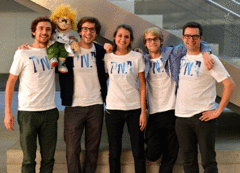Friday, 08 November, 2013
Bio-Molecular Design Award
First place for LMU Physics Team DNA Diamonds
The LMU physics undergraduate students Marinus Huber, Sebastian Huber, Florian Schüder and Florian Stehr received the international BIOMOD price for their project DNA Diamonds. The team developed an elegant method to attach single nanodiamonds to specific sites on artificial DNA constructions (DNA origami). Next to the grand prize the team also received the award for the best online presentation of their work in their lab Wiki. The students were supported by the PhD student Tao Zhang, graphic design student Milena Mayer (Uni Würzburg) and CeNS member Prof. Tim Liedl from the Faculty of Physics, LMU.
The aims of the groups research is to create defined hybrid structures of two or more nanodiamonds and other nanoparticles, to study their photon-based interactions and to finally assemble complex nanophotonic networks with unprecedented optical properties.
Nanodiamonds can act as bright single-photon-sources and are already hot candidates for applications such as bio-imaging or quantum cryptography. It is also known that clever placement of fluorescent nanodiamonds between gold nanoparticles could enhance their photonic qualities significantly. Having now the ability to spatially arrange these diverse nano-components with nanometer-precision will enable high-level research on optical quantum phenomena and bio-sensing.
To honor this success, the International Society for Nanoscale Science, Computation, and Engineering (ISNSCE) awarded $800,00 price money to the LMU team.
About BIOMOD
The BIOMOD competition is organised by the Wyss Institute for Biologically Inspired Engineering at Harvard University (USA) and now took place for the third time:
BIOMOD is a bio-molecular design competition that provides undergraduates an opportunity to systematically engineer the self-assembly of biological macromolecules into complex nanoscale machines for scientific and technological purposes. Students form teams in the early spring, and then spend the summer to design, build, and analyze their systems. All teams converge at the Wyss Institute for Biologically Inspired Engineering at Harvard in the fall to present their work. (Source: biomod.net)
This year, over 200 competitors from 23 teams from top universities all over the world presented their projects in Boston, Massachusetts. The teams presented inspiring projects on biomolecular robotics, biomolecular logic and computing, and structural bionanotechnology.


